翻译易错句集锦
翻译硕士总结汉译英最易翻错的句子

翻译硕士总结汉译英最易翻错的句子01. 有他这颗扫帚星,什么事情都办不成。
[误] With a comet like him, nothing can be accomplished.[正] With a jinx like him, nothing can be accomplished.注:“扫帚星”是中国人对“慧星”(comet)的俗称,因其后面象拖着的一条像扫帚一样的长尾巴而得名。
在中国古代,“扫帚星”被认为是灾难的预兆,并被用来比喻不吉利的人或事;祸根:(person or thing that is thought to bring)bad luck(to sb/sth);curse。
英语的comet 虽然没有这层含义,但却有一个对应的说法,即jinx。
例:There’s a jinx on/Someone’s put a jinx on this car: it’s always giving me trouble. “这辆汽车上有什么妨人的东西,总给我找麻烦”。
02.萝卜青菜,各有所爱。
[误] Some prefer radish but others prefer cabbage.[正] Tastes differ.注:Tastes differ/vary 是句英语谚语,除此以外,原句还可翻译成No dish suits all tastes 或You can never make everyone happy 等。
《新概念英语》第三册第23课的标题是:One man’s meat is another man’s poison,表达的很生动。
总之,应采取意译。
03.他一向嘴硬,从不认错。
[误] He has always got a hard mouth and never admit a fault.[正] He never says uncle.注:say (cry) uncle: to give up or in; to surrender; to admit defeat. Mainly used by boys, as when fighting。
普特—容易翻译错误的10个句子

容易翻译错误的10个句子1. It is two years since I smoked.误:我抽烟已经两年了。
正:我戒烟已经两年了。
析:在“It is +时间段+since 从句”中,若表示时间的since 从句中的谓语动词是持续性动词,则这个时间段是从这个持续性动作结束时算起。
如:It is ten years since she was here. 她不在这里已经十年了。
2. All of us are not for the plan.误:我们大家都不赞成这个计划。
正:并非我们大家都赞成这个计划。
析:all/both/everything 等用于否定结构时不表示全部否定,而表示部分否定。
如:Not both of them are right. (并非他们两人都是对的。
)又如:She doesn't like everything here. (她并非喜欢这里的一切。
)3. We can't be too careful in doing such experiments.误:做这样的实验,我们不能太仔细。
正:做这样的实验,我们必须非常非常仔细。
析:“can not……too……”句式表示“无论怎样也不过分”、“越……越好”。
如:We can not estimate the value of modern science too much. (对于现代科学的价值,我们无论作怎样的评价也不算过分。
)4. She isn't hungry a little.误:她一点也不饿。
正:她非常饿。
析:“not a little ”意为“很”、“非常”。
“not a bit ”和“not in the least ”则意为“一点也不”。
如:She isn't hungry a bit. (她一点也不饿。
)5. The man is too strong not to lift the box up.误:这个人力气不够大,不能把这只箱子提起来。
最容易翻译错的25个汉语句子
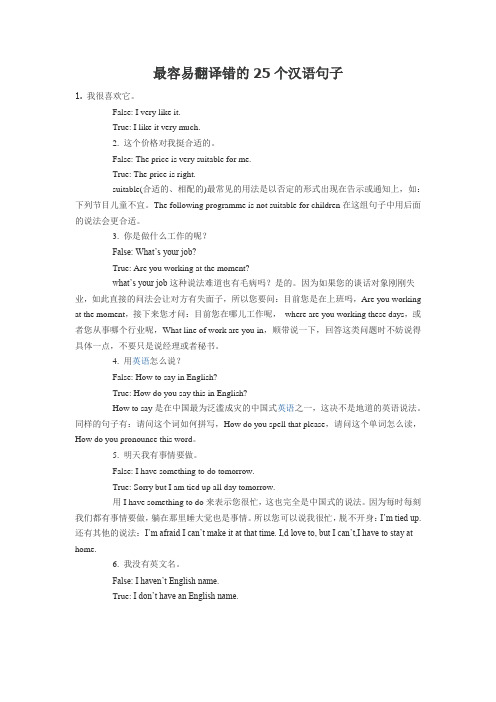
最容易翻译错的25个汉语句子1. 我很喜欢它。
False: I very like it.True: I like it very much.2. 这个价格对我挺合适的。
False: The price is very suitable for me.True: The price is right.suitable(合适的、相配的)最常见的用法是以否定的形式出现在告示或通知上,如:下列节目儿童不宜。
The following programme is not suitable for children在这组句子中用后面的说法会更合适。
3. 你是做什么工作的呢?False: What’s your job?True: Are you working at the moment?what’s your job这种说法难道也有毛病吗?是的。
因为如果您的谈话对象刚刚失业,如此直接的问法会让对方有失面子,所以您要问:目前您是在上班吗,Are you working at the moment,接下来您才问:目前您在哪儿工作呢,where are you working these days,或者您从事哪个行业呢,What line of work are you in,顺带说一下,回答这类问题时不妨说得具体一点,不要只是说经理或者秘书。
4. 用英语怎么说?False: How to say in English?True: How do you say this in English?How to say是在中国最为泛滥成灾的中国式英语之一,这决不是地道的英语说法。
同样的句子有:请问这个词如何拼写,How do you spell that please,请问这个单词怎么读,How do you pronounce this word。
5. 明天我有事情要做。
False: I have something to do tomorrow.True: Sorry but I am tied up all day tomorrow.用I have something to do来表示您很忙,这也完全是中国式的说法。
英译中易错
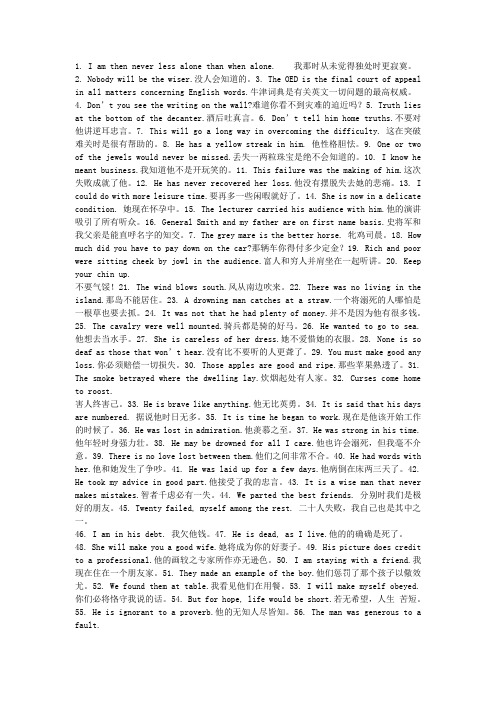
1. I am then never less alone than when alone. 我那时从未觉得独处时更寂寞。
2. Nobody will be the wiser.没人会知道的。
3. The OED is the final court of appeal in all matters concerning English words.牛津词典是有关英文一切问题的最高权威。
4. Don’t you see the writing on the wall?难道你看不到灾难的迫近吗?5. Truth lies at the bottom of the decanter.酒后吐真言。
6. Don’t tell him home truths.不要对他讲逆耳忠言。
7. This will go a long way in overcoming the difficulty. 这在突破难关时是很有帮助的。
8. He has a yellow streak in him. 他性格胆怯。
9. One or two of the jewels would never be missed.丢失一两粒珠宝是绝不会知道的。
10. I know he meant business.我知道他不是开玩笑的。
11. This failure was the making of him.这次失败成就了他。
12. He has never recovered her loss.他没有摆脱失去她的悲痛。
13. I could do with more leisure time.要再多一些闲暇就好了。
14. She is now in a delicate condition. 她现在怀孕中。
15. The lecturer carried his audience with him.他的演讲吸引了所有听众。
16. General Smith and my father are on first name basis.史将军和我父亲是能直呼名字的知交。
实用 翻译 易错句子

1.Saying is easy.Doing is difficult. 说起来容易,做起来难。
2.Seeing is believing. 眼见为实。
3.Teaching is learning. 教学相长。
4.driving is exciting. 开车真是刺激。
5.Lying is a bad habit. 说谎是一个坏习惯。
6.Getting daily exercise is important. 每天锻炼很重要。
7.Listening to his speech is boring. 听他的演讲很无聊。
8.Parking is prohibited here. 此地禁止停车。
9.Raising children is a big responsibility. 养育孩子是一项重大责任。
10.Walking in the rain is romantic. 雨中漫步很浪漫。
11.Climbing the mountain in winter is dangerous. 冬季登这座山很危险。
12.Driving to Shenzhen will take us 2 hours. 冬季开车去深圳要2小时。
13.Asking a woman's age is impolite in my country. 在我们国家,问女士的年龄是不礼貌的。
14.Riding with a drunken driver is a risk. 乘坐一个喝醉酒的司机的车是一种冒险。
15.Speaking in public is a challenge to a lot of people. 对许多人来说,公众演讲是一大挑战。
16.Finding your office isn't easy. 你们办公室真是难找。
17.Hearing the other side of the story would be interesting. 听听这个故事的另一面可能会很有意思。
新汉译英最易翻错的100句
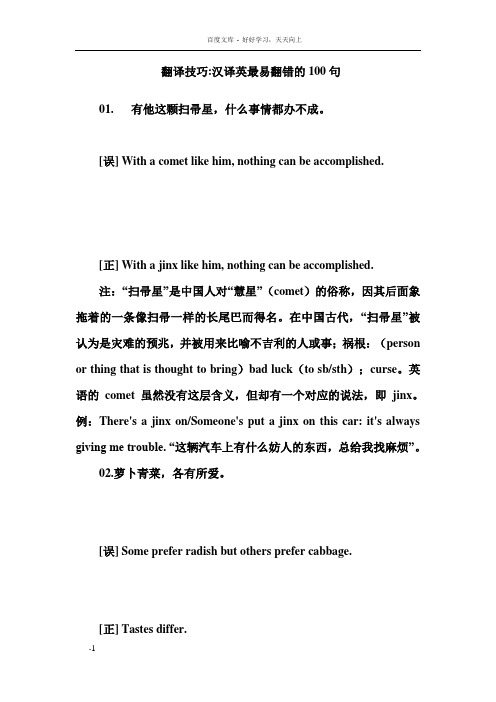
翻译技巧:汉译英最易翻错的100句01. 有他这颗扫帚星,什么事情都办不成。
[误] With a comet like him, nothing can be accomplished.[正] With a jinx like him, nothing can be accomplished.注:“扫帚星”是中国人对“慧星”(comet)的俗称,因其后面象拖着的一条像扫帚一样的长尾巴而得名。
在中国古代,“扫帚星”被认为是灾难的预兆,并被用来比喻不吉利的人或事;祸根:(person or thing that is thought to bring)bad luck(to sb/sth);curse。
英语的comet 虽然没有这层含义,但却有一个对应的说法,即jinx。
例:There's a jinx on/Someone's put a jinx on this car: it's always giving me trouble. “这辆汽车上有什么妨人的东西,总给我找麻烦”。
02.萝卜青菜,各有所爱。
[误] Some prefer radish but others prefer cabbage.[正] Tastes differ.注:Tastes differ/vary 是句英语谚语,除此以外,原句还可翻译成No dish suits all tastes 或You can never make everyone happy 等。
《新概念英语》第三册第23课的标题是:One man's meat is another man's poison,表达的很生动。
总之,应采取意译。
03.他一向嘴硬,从不认错。
[误] He has always got a hard mouth and never admit a fault.[正] He never says uncle.注:say (cry) uncle: to give up or in; to surrender; to admit defeat. Mainly used by boys, as when fighting。
英文翻译易错句30句
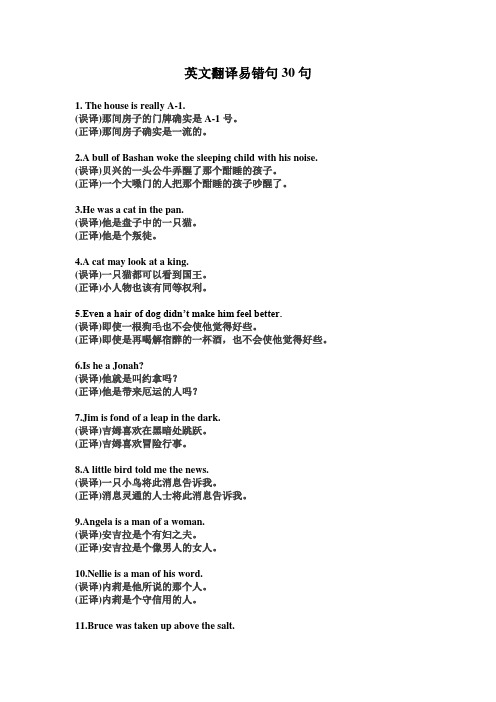
英文翻译易错句30句1. The house is really A-1.(误译)那间房子的门牌确实是A-1号。
(正译)那间房子确实是一流的。
2.A bull of Bashan woke the sleeping child with his noise. (误译)贝兴的一头公牛弄醒了那个酣睡的孩子。
(正译)一个大嗓门的人把那个酣睡的孩子吵醒了。
3.He was a cat in the pan.(误译)他是盘子中的一只猫。
(正译)他是个叛徒。
4.A cat may look at a king.(误译)一只猫都可以看到国王。
(正译)小人物也该有同等权利。
5.Even a hair of dog didn’t make him feel better.(误译)即使一根狗毛也不会使他觉得好些。
(正译)即使是再喝解宿醉的一杯酒,也不会使他觉得好些。
6.Is he a Jonah?(误译)他就是叫约拿吗?(正译)他是带来厄运的人吗?7.Jim is fond of a leap in the dark.(误译)吉姆喜欢在黑暗处跳跃。
(正译)吉姆喜欢冒险行事。
8.A little bird told me the news.(误译)一只小鸟将此消息告诉我。
(正译)消息灵通的人士将此消息告诉我。
9.Angela is a man of a woman.(误译)安吉拉是个有妇之夫。
(正译)安吉拉是个像男人的女人。
10.Nellie is a man of his word.(误译)内莉是他所说的那个人。
(正译)内莉是个守信用的人。
11.Bruce was taken up above the salt.(误译)布鲁斯坐在盐上。
(正译)布鲁斯被请坐上席。
12.Colin is absent in Shanghai.(误译)科林现在不在上海。
(正译)克林去上海了,不在这里。
13.Her opinion is all my eye.(误译)她的主张也完全是我的观点。
英文翻译易错句30句

英文翻译易错句30句1. The house is really A-1.(误译)那间房子的门牌确实是A-1号。
(正译)那间房子确实是一流的。
2.A bull of Bashan woke the sleeping child with his noise. (误译)贝兴的一头公牛弄醒了那个酣睡的孩子。
(正译)一个大嗓门的人把那个酣睡的孩子吵醒了。
3.He was a cat in the pan.(误译)他是盘子中的一只猫。
(正译)他是个叛徒。
4.A cat may look at a king.(误译)一只猫都可以看到国王。
(正译)小人物也该有同等权利。
5.Even a hair of dog didn’t make him feel better.(误译)即使一根狗毛也不会使他觉得好些。
(正译)即使是再喝解宿醉的一杯酒,也不会使他觉得好些。
6.Is he a Jonah?(误译)他就是叫约拿吗?(正译)他是带来厄运的人吗?7.Jim is fond of a leap in the dark.(误译)吉姆喜欢在黑暗处跳跃。
(正译)吉姆喜欢冒险行事。
8.A little bird told me the news.(误译)一只小鸟将此消息告诉我。
(正译)消息灵通的人士将此消息告诉我。
9.Angela is a man of a woman.(误译)安吉拉是个有妇之夫。
(正译)安吉拉是个像男人的女人。
10.Nellie is a man of his word.(误译)内莉是他所说的那个人。
(正译)内莉是个守信用的人。
11.Bruce was taken up above the salt.(误译)布鲁斯坐在盐上。
(正译)布鲁斯被请坐上席。
12.Colin is absent in Shanghai.(误译)科林现在不在上海。
(正译)克林去上海了,不在这里。
13.Her opinion is all my eye.(误译)她的主张也完全是我的观点。
高中英语易译错的句子
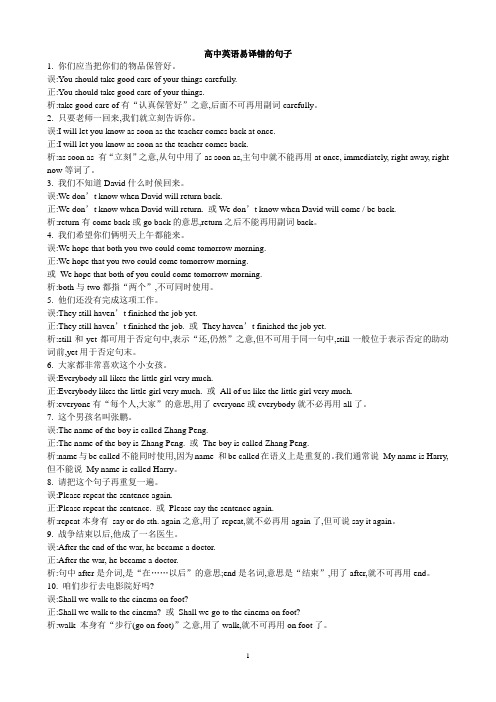
高中英语易译错的句子1. 你们应当把你们的物品保管好。
误:You should take good care of your things carefully.正:You should take good care of your things.析:take good care of有“认真保管好”之意,后面不可再用副词carefully。
2. 只要老师一回来,我们就立刻告诉你。
误:I will let you know as soon as the teacher comes back at once.正:I will let you know as soon as the teacher comes back.析:as soon as 有“立刻”之意,从句中用了as soon as,主句中就不能再用at once, immediately, right away, right now等词了。
3. 我们不知道David什么时候回来。
误:We don’t know when David will return back.正:We don’t know when David will return. 或We don’t know when David will come / be back.析:return有come back或go back的意思,return之后不能再用副词back。
4. 我们希望你们俩明天上午都能来。
误:We hope that both you two could come tomorrow morning.正:We hope that you two could come tomorrow morning.或We hope that both of you could come tomorrow morning.析:both与two都指“两个”,不可同时使用。
5. 他们还没有完成这项工作。
英汉汉英翻译易错句138例

英汉汉英翻译易错句138例1.It pays to get an education.受教育是划算的。
2.She pulled her car in the drive.他把车子停在私家车道上了。
此处drive作名词解释为“私家车道”。
3.The young man walked far into the woods to make water.那些年轻人走进森林深处去小便。
4.She always sleeps very late.他经常起得很迟。
5.The revolutionaries were beaten, refused anything to eat.那些革命者受到拷打,不准吃任何东西。
6.Michael is a man of many trades.Michael是一个从事很多行业的人。
pare the adjective “able”.说出able的原级、比较级和最高级。
8.The tunnel is 20 meters below the sea.隧道在海床底下20米。
海面下译为below the sea level/surface。
9.It is not a job for a man of his size.他这般能力人干这种工作不合适。
10.They were full brothers and lived a fast life.他们是亲兄弟,过着放荡的生活。
11.This is a bottle of noble gas.这是一瓶惰性气体。
12.Her eyes were shinning, but her face lost its color withintwenty seconds.她双目闪着光芒,可她的脸色骤然变了13.What she sent to me was an apology for a letter.他寄给我了一封不像样的信。
14.I was not here for my health.我并不是漫无目的地到这里。
24个极容易翻译错误的句子

容易翻译错误的几个句子..2009-03-11 15:331.Do you have a family?正确译文:你有孩子吗?2.It's a good father that knows his son.就算是最好的父亲,也未必了解自己的儿子.3.I have no opinion of that sort of man.我对这类人很反感.4.She put 5 dollars into my hand,"you have been a great man today."她把5美圆塞到我手上说:"你今天表现得很好."5.I was the youngest son, and the youngest but two.我是最小的儿子,但是我还有两个妹妹.6.The picture flattered her.她比较上照.7.The country not agreeing with her, she returned to England.她杂那个国家水土不服,所以回到了英国.8. He is a walking skeleton.他很瘦.9.The machine is in repair.机器已经修好了.10.He allowed the father to be overruled by the judge, and declared his own son guilty.他让法官的职责战胜了父子的亲情,最终宣布儿子有罪.11.You don't know what you are talking about.你在胡说八道.12.You don't begin to understand what they mean.你根本不知道他们在干嘛. don't begin :决不13.They didn't praise him slightly.他们大大地表扬了他.14.That's all I want to hear.我已经听够了.15.I wish I could bring you to see my point.你要我怎么说你才能明白呢.16.You really flatter me.你让我受宠若惊.17.He made a great difference.有他没他结果完全不一样.18.You cannot give him too much money.你给他再多的钱也不算多.19.The long exhausting trip proved too much.这次旅行矿日持久,我们都累倒了.20.The monk is only not a dead man.这个和尚虽然活着,但跟死了差不多.21.A surgeon made a cut in the patient's stomach.外科医生在病人胃部打了个洞.22.You look darker after the holiday.你看上去更健康了.23.As luck would have it, he was caught by the teacher again. 不幸的是,他又一次被老师逮个正着.24.She held the little boy by the right hand.。
文言文翻译时常见易错

一、实词易错1. 谓语动词误译例:孔子曰:“学而时习之,不亦说乎?”误译:孔子说:“学习并且时常练习,不是很高兴吗?”正译:孔子说:“学习并且时常温习,不是很愉快吗?”2. 名词误译例:子曰:“三人行,必有我师焉。
”误译:孔子说:“三个人一起走,一定有我当老师的人。
”正译:孔子说:“三个人一起行走,其中必定有我可以向他学习的人。
”3. 形容词误译例:孔子曰:“温故而知新,可以为师矣。
”误译:孔子说:“温习旧知识,能够知道新的东西,可以成为老师了。
”正译:孔子说:“温习旧知识,能够发现新的理解,可以成为别人的老师了。
”二、虚词易错1. 连词误译例:子曰:“知之者不如好之者,好之者不如乐之者。
”误译:孔子说:“了解它的人不如喜欢它的人,喜欢它的人不如享受它的人。
”正译:孔子说:“了解它的人不如爱好它的人,爱好它的人不如乐在其中的人。
”2. 代词误译例:子曰:“三人行,必有我师焉。
”误译:孔子说:“三个人一起走,一定有我当老师的人。
”正译:孔子说:“三个人一起行走,其中必定有我可以向他学习的人。
”3. 介词误译例:子曰:“学而时习之,不亦说乎?”误译:孔子说:“学习并且时常练习,不是很高兴吗?”正译:孔子说:“学习并且时常温习,不是很愉快吗?”三、句式易错1. 被动句误译例:子曰:“学而不思则罔,思而不学则殆。
”误译:孔子说:“学习而不思考就会迷失,思考而不学习就会陷入困境。
”正译:孔子说:“学习而不思考就会一无所获,思考而不学习就会陷入危险。
”2. 判断句误译例:子曰:“仁者,爱人。
”误译:孔子说:“有仁德的人,是爱别人的人。
”正译:孔子说:“有仁德的人,就是爱人。
”综上所述,文言文翻译时易错字众多,需要在翻译过程中细心辨别,正确理解文言文的语法、词汇和表达方式,以确保翻译的准确性和流畅性。
翻译中容易出错的英语句子

翻译中容易出错的英语句子(经典版)编制人:__________________审核人:__________________审批人:__________________编制单位:__________________编制时间:____年____月____日序言下载提示:该文档是本店铺精心编制而成的,希望大家下载后,能够帮助大家解决实际问题。
文档下载后可定制修改,请根据实际需要进行调整和使用,谢谢!并且,本店铺为大家提供各种类型的经典范文,如演讲稿、总结报告、合同协议、方案大全、工作计划、学习计划、条据书信、致辞讲话、教学资料、作文大全、其他范文等等,想了解不同范文格式和写法,敬请关注!Download tips: This document is carefully compiled by this editor. I hope that after you download it, it can help you solve practical problems. The document can be customized and modified after downloading, please adjust and use it according to actual needs, thank you!In addition, this shop provides you with various types of classic sample essays, such as speech drafts, summary reports, contract agreements, project plans, work plans, study plans, letter letters, speeches, teaching materials, essays, other sample essays, etc. Want to know the format and writing of different sample essays, so stay tuned!翻译中容易出错的英语句子我们的翻译人员在翻译的时候也要注意一些短语的意思,接下来,本店铺给大家准备了翻译中容易出错的英语句子,欢迎大家参考与借鉴。
容易翻译错误的句子

容易翻译错误的句子1.中国的京剧你觉得怎样?How do you think of Chinese opera ? (误)What do you think of Chinese opera? (正)How do you feel about Chinese opera? (正)How do you like Chinese opera? (正)2.第二次世界大战是在一九四五年八月十五日结束的。
The World War II came to an end on August 15, 1945. (误)World War II came to an end on August 15th, 1945. (正)The second World War ended on August 15th, 1945. (正)3.昨天晚上我们整晚在看电视。
We spent last evening watching the television. (误)We spent last evening watching television. (正)注:”Television” is uncountable. The countable term is a “television set”.4.旅行社告诉了我们许多关于夏威夷的情形。
The travel agency sent us many information about the Hawaiian Islands. (误)The travel agency sent us much information about the Hawaiian Islands. (正)注:”Information” is uncountable.5.假期从明天开始。
The vacation begins from tomorrow. (误)The vacation begins tomorrow. (正)注:We don’t say “begin from”, but “start from”. Other collocations with “begin”: The new term begins in April / on the 5th of April. The tea party begins at six o’clock. Education begins with a man’s birth.6.这只表的价钱很贵。
(完整版)英语翻译易错语句

(完整版)英语翻译易错语句1. Nobody will be the wiser.谁也不会更为聪明。
(误)谁也不懂得。
(正)注:英语形容词wise 有三个基本意思:(1) 聪明的,如You were wise not to go.(你不去是聪明的)。
(2) 饱学的,如He is wise in the law.(他精通法律)。
(3)知道的,如We are none the wiser for his explanations.(听完他的解释,我们还是不明白)。
上例便是第三义,等于说Nobody will know it. 通常比较级,意为“至今不知道的事,现在知道了”,所谓none the wiser= no wiser than before= as wise as before,照旧。
2.Don't you see the writing on the wall?你看不见墙上的字吗?(误)难道你看不到灾难的迫切吗?(正)注:The writing on the wall (or sometimes 'handwriting on the wall') is an expression that suggests a portent of doom or misfortune. It originates in the Biblical book of Daniel - where supernatural writing fortells the demise of the Babylonian Empire, but it has come to have a wide usage in language and literature.3.Truth lies at the bottom of the decanter.真相从玻璃酒瓶地下看出来。
(误)酒后吐真言。
(正)4.Don't tell him home truths.不要告诉他家里的真相。
最容易翻译错的25个汉语句子

最容易翻译错的25个汉语句子1. 你是做什么工作的呢?False: What’s your job?True: Are you working at the moment?what’s your job这种说法难道也有毛病吗?是的。
因为如果您的谈话对象刚刚失业,如此直接的问法会让对方有失面子,所以您要问:目前您是在上班吗,Are you working at the moment,接下来您才问:目前您在哪儿工作呢,where are you working these days,或者您从事哪个行业呢,What line of work are you in,顺带说一下,回答这类问题时不妨说得具体一点,不要只是说经理或者秘书。
2. 我很喜欢它。
False: I very like it.True: I like it very much.3 这个价格对我挺合适的。
False: The price is very suitable for me.True: The price is right.suitable(合适的、相配的)最常见的用法是以否定的形式出现在告示或通知上,如:下列节目儿童不宜。
The following programme is not suitable for children在这组句子中用后面的说法会更合适。
4. 用英语怎么说?False: How to say in English?True: How do you say this in English?How to say是在中国最为泛滥成灾的中国式英语之一,这决不是地道的英语说法。
同样的句子有:请问这个词如何拼写,How do you spell that please,请问这个单词怎么读,How do you pronounce this word。
5. 明天我有事情要做。
False: I have something to do tomorrow.True: Sorry but I am tied up all day tomorrow.用I have something to do来表示您很忙,这也完全是中国式的说法。
- 1、下载文档前请自行甄别文档内容的完整性,平台不提供额外的编辑、内容补充、找答案等附加服务。
- 2、"仅部分预览"的文档,不可在线预览部分如存在完整性等问题,可反馈申请退款(可完整预览的文档不适用该条件!)。
- 3、如文档侵犯您的权益,请联系客服反馈,我们会尽快为您处理(人工客服工作时间:9:00-18:30)。
1.All that evening this thought kept coming back; but, as is not unusual, each time with less poignancy, till it seemed almost a matter of course to be a scoundrel.
原译:那天晚上,他翻来覆去想这个问题:但是,正如同常情况下那样,强烈的程度逐渐减低,末了,坏蛋几乎是做定了。
改译:那天晚上,这种想法不断地涌现在他的脑海里,但是,和往常一样,每次这样想时痛悔的感觉会愈来愈淡,直到最后似乎觉得做坏蛋也是理所当然的了。
分析:“poignancy”按《Oxford Advanced Learner’s
English-Chinese Dictionary》解释为affecting one’s feelings deeply, full of pit是“伤心的”和“遗憾”之意,“强烈的程度逐渐减低”让人读起来不知所云。
将“almost a matter of course to be a scoundrel”,译为“做坏蛋也是理所当然的了”会更加通顺。
2.Tall, thin, elegant, with the air of thoroughbred, he stuck
Mr.Pearson as a curious mixture of a condottiere and Machiavelli.
原译:他身材修长,温文尔雅,风度翩翩。
皮尔逊先生从他身上得到的印象是:他是雇佣兵和马其雅维里的奇妙的混合物。
改译:他身材修长,温文尔雅,风度翩翩。
皮尔逊先生从他身上得到的印象是:此人居然集雇佣兵和权谋术士的特点于一身。
分析:“Machiavelli”是意大利古代政治家兼历史学家。
他主张为了达到政治目的可以不择手段,马其雅维里的奇妙的混合物让人读起来不知所云,将Machiavelli译为“权谋术士”让人更好理解。
3There you are the dog in the manger! You won’t let him discuss you affairs, and you are annoyed when he talks about his own.
原译:你狗占马槽!你不让他谈你的事,可他讲他自己的事你又恼了。
改译:你不干还不让别人干!你不让他谈你的事,可他讲他自己的事你又恼了。
分析:在翻译中不能根据原文的风格灵活处理,也有可能达不到“传真”的效果。
比如“a dog in the manger”常被直译为“狗占马槽”,但用在上例中似乎就不合适了。
应译为“你不干还不让别人干!”才达意。
4Quite clearly, the third world has changed much since the 1950s and their old cliché-ridden image of the period can hardly apply to them now.
原译:很显然,50年代以来第三世界发生了很大的变化;第三世界国家当年那种陈腐不堪的旧形象与他们现实的情况已难以对上号了。
改译:很显然,50年代以来第三世界发生了很大的变化;第三世界国家当年那种陈腐不堪的旧形象与他们现实的情况不可同日而语。
分析:原译中“难以对上号”有显著的口语俗语色彩,仔细阅读原文就会发现这是一篇公文语体,从理解原文的风格色彩角度来说改译成“不可同日而语”会更好些。
5To transplant her to a great town, to keep, in some little flat or rooms, one who belonged so wholly to nature——the poet in him shrank from it.
原译:把她弄到大城市里去,在一套房子或几间房子里安置这么一位大自然中的人——他虽然有诗人气质,却不敢这么设想。
改译:把她调到大城市里去,居住在狭小的公寓里,像她这样一位完全属于大自然的人——尤其是一位诗人,她宁愿不去。
分析:“transplant her”译成“把她弄到”实为不“雅”。
英语习惯上使用从句较多,该句中定语从句较长,分开译比较符合汉语习惯。
“shrink from sth”按《Oxford Advanced Learner’s English-Chinese Dictionary》解释为be reluctant to do sth“不愿做某事”,shrank from it应理解为她“不愿意去”大城市生活。
6 原文:As it happens, a razor that is safe in Europe is unlikely to electrocute Americans.
原译:碰巧在欧洲使用安全的剔须刀不大可能使美国人触电身亡。
改译:实际上,在欧洲使用安全的剔须刀不大可能使美国人触电身亡。
分析:“as it happens”在一般词典中解释为“偶然,碰巧”。
“原译”译文读起来明显不顺畅,原译将“as it happens”译为“碰巧”是译者按通常字面意思来理解的。
查《The New Oxford Dictionary of English》,“as it happens ”还可以解释为“actually; as a matter of fact”,因此,译成“实际上”较为准确。
7.原文:The custom had its spring in another country.
原译:这种风俗在别的国家也有它的春天。
改译:这种风俗起源于别的国家。
分析:“spring”的含义有“春天”之意,查《Oxford Advanced Learner’s English-Chinese Dictionary》“have its spring”的准确含义应解释为:have sth as a source or origin; originate from,改译为“起源于...”较为准确。
8The youth move a pace or two nearer, and the scent of his honest heat afflicted Ashurst’s nostrils.
原译:年轻人向前走了两步,一股热汗的味道冲进阿瑟斯特鼻孔里。
改译:年轻人向前走近了一两步,他那毫无掩饰的怒气冲阿瑟斯特扑面而来。
分析:从原文来看,“heat”一般情况下,译者都会理解为“热汗”,但查《Oxford Advanced Learner’s English-Chinese Dictionary》,“heat”还可解释为intense feeling, esp of anger or excitement“怒气”或“激动”,若译作“热汗”,修饰语“honest”似乎无法理解,因此改译成“怒气”更为贴切。
